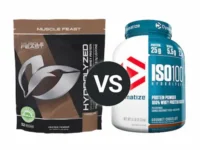Knowledge BaseYou're Questions Answered
What are the benefits of whey hydrolysate?
Whey hydrolysate, also known as hydrolyzed whey protein, is a form of whey protein that has been enzymatically pre-digested or broken down into smaller peptides and amino acids. This process enhances its digestibility and absorption rates, making it particularly beneficial for specific dietary and fitness goals.
Key Benefits of Whey Hydrolysate
- Enhanced Absorption: The hydrolysis process breaks down the protein into smaller components, making it easier and faster for the body to absorb. This rapid absorption is beneficial for post-workout recovery, as it helps deliver amino acids to muscles more quickly to initiate repair and growth1.
- Reduced Allergenic Potential: Because it is broken down into smaller peptides, whey hydrolysate is often less allergenic and can be easier on the digestive system, making it a suitable option for individuals with mild lactose intolerance or those who experience discomfort with other forms of whey protein2.
- Support Muscle Recovery: The quick delivery of amino acids to muscles not only supports faster recovery post-exercise but also helps in reducing muscle soreness and enhancing muscle synthesis, which is crucial for athletes and individuals engaged in regular intense physical activities3.
- Improved Insulin Response: Consuming whey hydrolysate can lead to a more rapid and greater spike in insulin levels compared to other forms of protein. This can be advantageous for promoting an anabolic environment conducive to muscle growth and recovery4.
Choosing Whey Hydrolysate
When selecting a whey hydrolysate product, consider the extent of hydrolysis, which can affect both the taste and cost of the product. Highly hydrolyzed whey protein might taste more bitter but offers more rapid absorption benefits. It’s also important to look for products with minimal additives and artificial ingredients to maximize health benefits.
Overall, whey hydrolysate is an excellent choice for those looking for quick-absorbing protein to support intense training regimens, improve recovery times, and reduce potential digestive issues associated with protein supplements.
- Kanda, A., Nakayama, K., Sanbongi, C., Nagata, M., Ikegami, S., & Itoh, H. (2016). Effects of whey, caseinate, or milk protein ingestion on muscle protein synthesis after exercise. Nutrients, 8(6), 339.
- Hoffman, J. R., & Falvo, M. J. (2004). Protein – Which is Best? Journal of Sports Science and Medicine, 3(3), 118-130.
- Buckley, J. D., Thomson, R. L., Coates, A. M., Howe, P. R., DeNichilo, M. O., & Rowney, M. K. (2010). Supplementation with a whey protein hydrolysate enhances recovery of muscle force-generating capacity following eccentric exercise. Journal of Science and Medicine in Sport, 13(1), 178-181.
- Power, O., Hallihan, A., & Jakeman, P. (2009). Human insulinotropic response to oral ingestion of native and hydrolysed whey protein. Amino Acids, 37(2), 333-339.
Related Questions
Related Reviews

Your Answer
We are a participant in the Amazon Services LLC Associates Program, an affiliate advertising program designed to provide a means for us to earn fees by linking to Amazon.com and affiliated sites.


